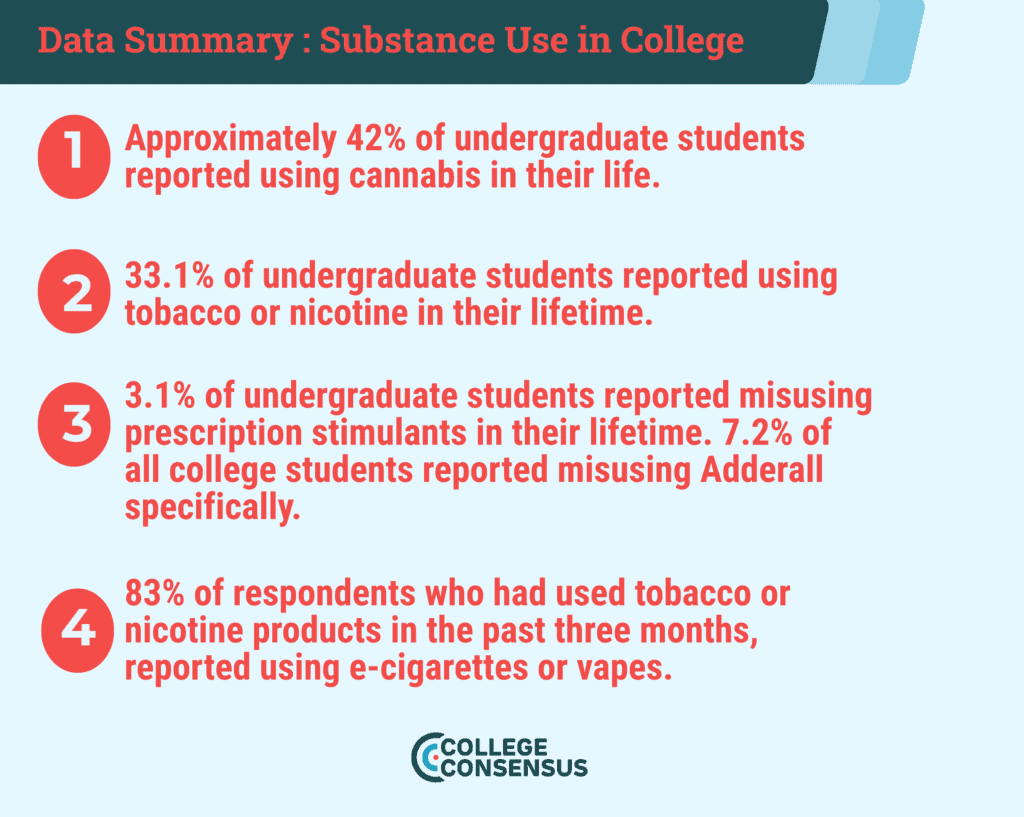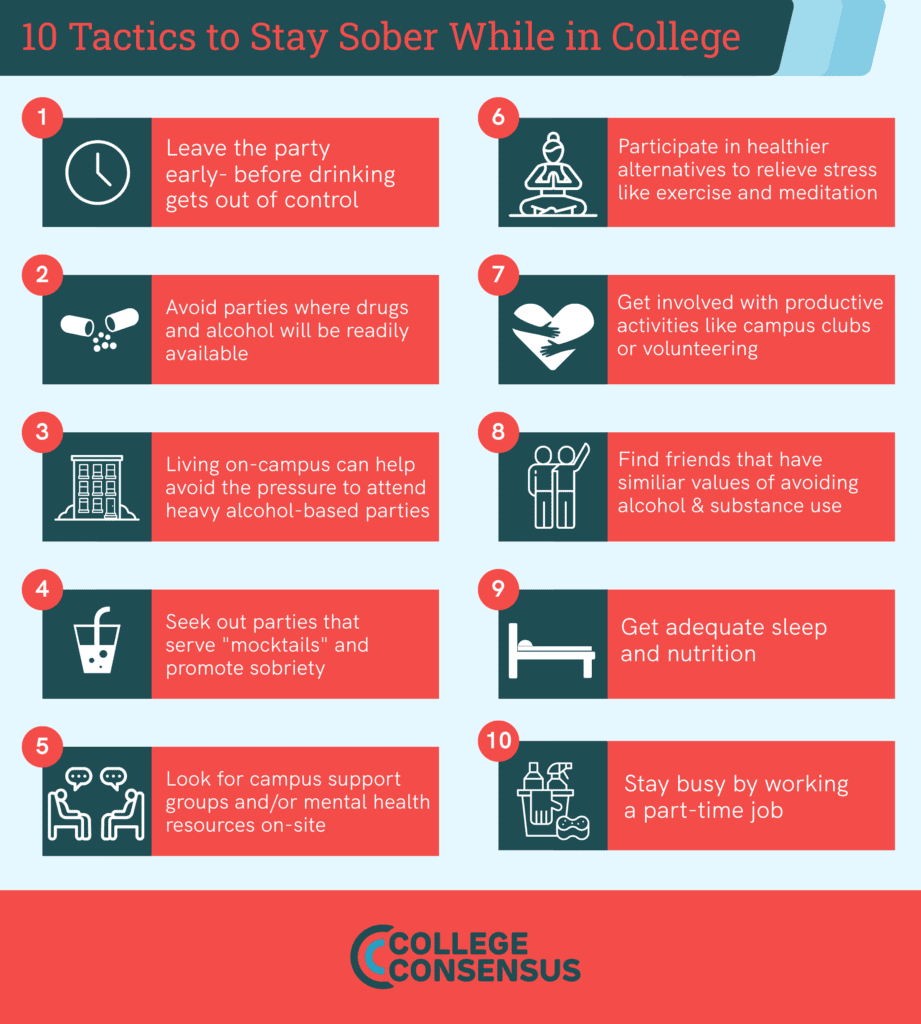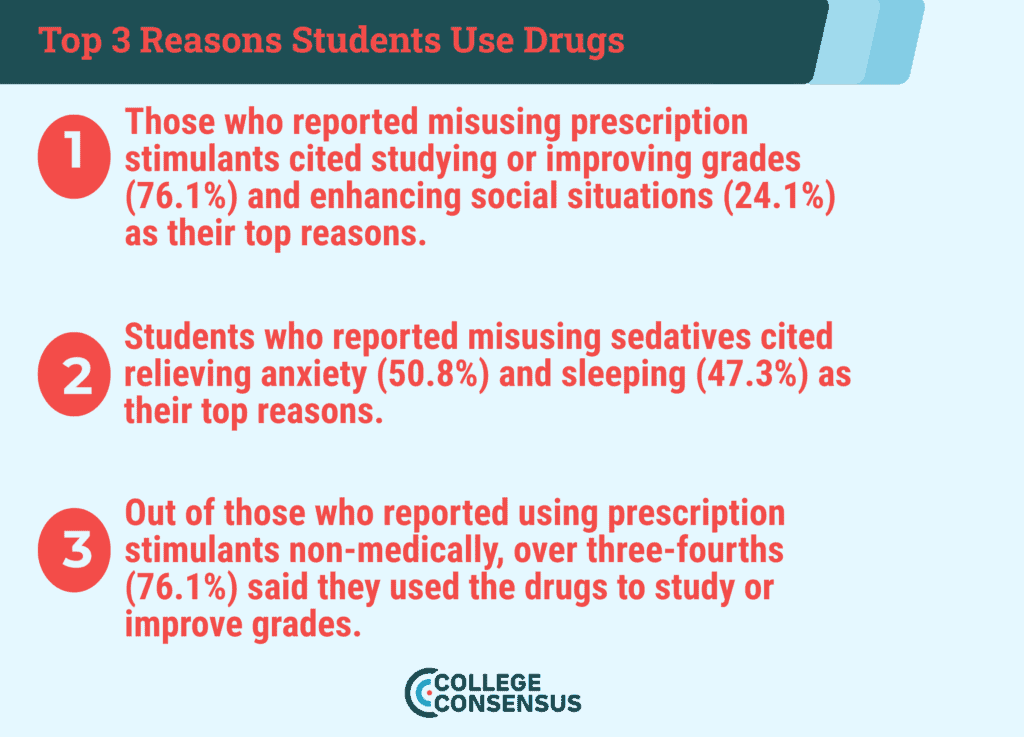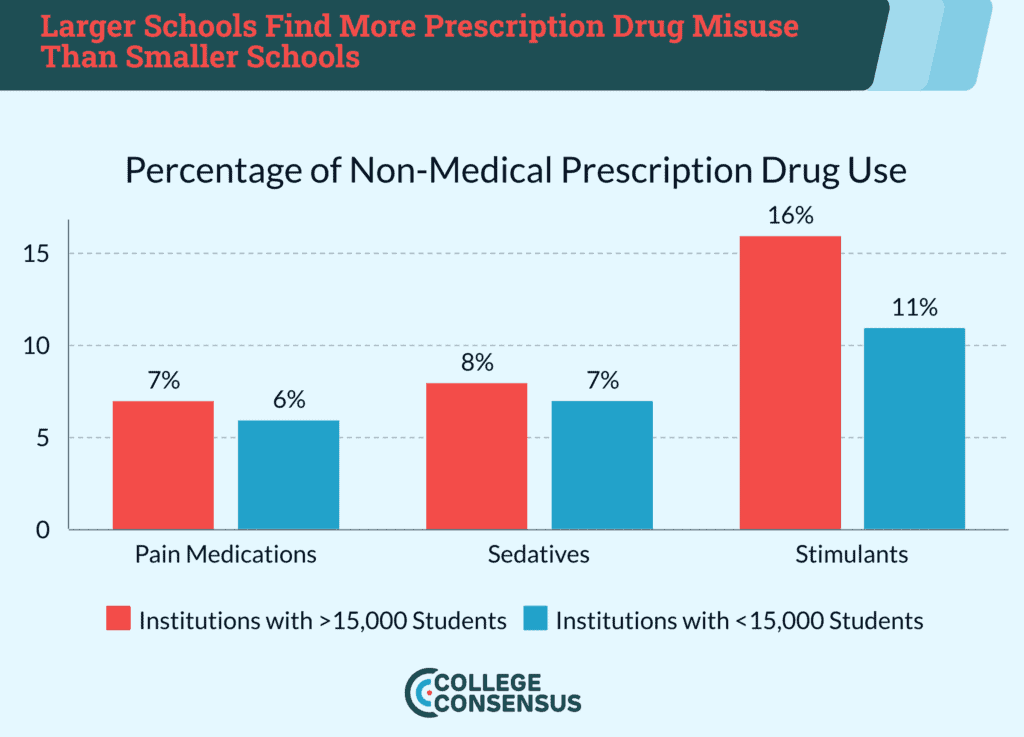College is a time of transition for many young adults. Along with opportunities to grow and thrive, students face tremendous pressure to perform. The temptation to blow off steam by trying alcohol or drugs, combined with the widespread availability of these substances, makes students vulnerable to substance abuse and addiction.
Addiction actually rewrites neural pathways and changes the way a person’s brain works. This makes it difficult to reduce consumption or attempt to quit using drugs. Addiction can impact anyone, regardless of gender, race, or socioeconomic status. However, there are some factors that make college students particularly vulnerable. Stressors such as being far from home, feeling pressure to do well in school, and wanting to fit in can all impact student’s decisions regarding alcohol and drug use.

References:
- National College Health Assessment III: Undergraduate Student Reference Group Data Report Spring 2022 (PDF). The American College Health Association. Spring 2022.
- Monitoring the Future National Survey Results on Drug Use, 1975-2020: Volume II, College Students and Adults Ages 19-60 (PDF). The University of Michigan. Institute for Social Research. July 2021.
Factors Impacting Collegiate Drug Use
Learn more about factors that influence the use of drugs and alcohol on college campuses.
Stress and Drugs
Stress can trigger the brain to release hormones based in the reward center. This is the same area impacted by the euphoric effects of alcohol and drugs. While some students use illicit substances to reduce and cope with stress or trauma, others may become dependent on drugs, alcohol, or both.
In other cases, students may use substances to enhance their mood or performance in school. Some students may drink to loosen up and improve social interactions. However, this can lead to increased cravings and dependence on illicit substances.
Away From Home and Alone
Being far from home can also influence substance use and addiction among college students. For many students, college is the first time they live away from their family and friends, which can cause feelings of loneliness, homesickness, or isolation. Some students may seek new friends or groups that share their interests or values, but others may have difficulty finding a sense of belonging or identity. They may use substances to fit in with their peers or to escape from their emotional distress.
Peer pressure and social norms can also affect substance use and addiction among college students. For example, some students may perceive binge drinking or drug use as normal or expected behaviors at student housing parties or Greek social events. However, these behaviors can have serious consequences for health, safety, and academic performance.
All in the Family? (Maybe)
Genetic factors can also impact a student’s likelihood of substance use and addiction. Genes may account for over 40% of a student’s risk of developing an addiction. Plus, a person’s genetic makeup affects how they respond to substances, including how fast they become addicted.
Substance use and addiction among college students can have negative impacts on their physical, mental, and social well-being. Some of the consequences of substance abuse among college students include:
- Poor academic performance: Substance abuse can impair memory, concentration, motivation, and decision-making skills, negatively affecting grades, attendance, and retention.
- Health problems: Substance abuse can increase the risk of injuries, accidents, overdoses, infections, chronic diseases, and mental disorders. For example, alcohol disorder can lead to liver cirrhosis and disability if left untreated.
- Legal troubles: Substance abuse can lead to violations of campus policies or laws regarding underage drinking, driving under the influence (DUI), possession or distribution of illegal drugs, or sexual assault. This impacts more than the person with the addiction problem. Family, friends, and bystanders often take the brunt of drug and alcohol-related violence and erratic behavior.
- Relationship issues: Substance abuse can damage trust, communication, and intimacy with family, friends, and romantic partners. Sometimes, addiction becomes the most important thing in a student’s life. This can do irreparable damage to long-term relationships and newly-minted friendships.
- Addiction: Substance abuse can result in physical and psychological dependence on substances. However, recovery resources are available.
There are some great prevention strategies, including the following:
- Learning about the risks of substance abuse.
- Seeking activities that promote healthy coping skills.
- Creating a campus environment that fosters sobriety and understanding.
- Implementing intervention programs for students who need help.
- Enforcing campus policies to discourage substance abuse.
Treatment options include traditional and holistic recovery techniques, such as counseling to raise awareness of the underlying causes of substance abuse. Medication-assisted treatment (MAT) can reduce cravings and withdrawal symptoms so that students with substance abuse issues can remain comfortable throughout the withdrawal process.
Established support groups or peer recovery programs are a great place to meet peers with similar issues. These groups provide layered support, because they serve members at every stage of the recovery process. Students may also consider enrolling in collegiate recovery programs (CRPs) to find academic, social, wellness, and emotional support.
Substance abuse and addiction are serious issues that affect many college students. However, with awareness, prevention, and treatment, students can overcome their challenges and achieve their goals.
Sobering Statistics About College Students and Substance Abuse
Here are some staggering statistics on college students and substance use.
- The National Institute on Drug Abuse (NIDA) found that 38% of college students reported using any illicit drug in the past year, compared to 40.9% of their non-college peers.
- The Substance Abuse and Mental Health Services Administration (SAMHSA) reports that 54.9% of full-time college students aged 18 to 22 reported binge drinking in the past month.
- A study by the University of Michigan examined the trends and patterns of vaping among college students and young adults, It turns out that 11% of college students used e-cigarettes in the past 30 days

Online Resources for College Students Fighting Addiction
College and university students have many places to turn for assistance with addiction treatment and recovery.
Association of Recovery in Higher Education (ARHE)
The Association of Recovery in Higher Education (ARHE) is a national organization that supports collegiate recovery programs (CRPs) and communities (CRCs). It provides education, resources, and community connection to help students in recovery succeed in higher education.
Behavioral Health Among College Students
Students can visit this site for a SAMHSA kit containing comprehensive information on behavioral health problems among college students, including risk factors, prevention strategies, and resources for students and professionals.
Campus Drug Prevention
At Campus Drug Prevention, college attendees will find information on the importance of preventing drug abuse, as well as resources for campus administrators, students, and parents.
Find Support
Students and allies can also find support on this SAMHSA website that provides contact information for mental health and substance abuse support services in their communities.
Find Treatment
This Substance Abuse and Mental Health Services Administration (SAMHSA) website helps people find treatment programs in their communities. Users can find programs that meet their needs.
Get Smart About Drugs
Students can Get Smart About Drugs by visiting the National Institute on Drug Abuse (NIDA) website which talks about the effects of drugs on the brain and body and provides tips for staying safe and healthy.
Just Think Twice
Courtesy of the National Institute on Alcohol Abuse and Alcoholism (NIAAA), the Just Think Twice site provides information on the risks of underage drinking and offers guidance for those who want to help young people make healthy choices about alcohol.
Live Another Day
This hopefully named website offers advice for students that encourages them to live one day at a time. Live Another Day is administered by the American Foundation for Suicide Prevention (AFSP) and has suicide prevention resources for those struggling with suicidal thoughts or who have lost someone to suicide.
The Recovery Village, Resources for College Students
The Recovery Village, Resources for College Students provides information and resources for college students struggling with substance abuse or other behavioral health problems.
Start Your Recovery
Start Your Recovery has tons of information and resources for students and administrators. The site supports those in recovery from substance abuse or behavioral health problems.
Studies on Addiction and Recovery in College
These studies provide important insights into addiction and substance abuse among college students:
- Ballard Brief, Substance Abuse Among College Students in the United States: This concise overview explores the prevalence, consequences, and solutions of substance abuse among US college students. It’s a great way to get information specific to college and university enrollees.
- College fields of study and substance use: Readers can examine the relationship between college fields of study and substance use. It turns out that certain majors, such as engineering and business, were more likely to report binge drinking and marijuana use.
- The National Institute on Drug Abuse at The National Institutes of Health, Monitoring the Future: National Survey Results on Drug Use: Providing data on drug use trends among US adolescents and young adults, this study found that college students use drugs more often than peers who don’t attend college.
- NCAA Sport Science Institute, NCAA Drug Testing Program 2022-2023: Find out about the NCAA’s drug testing program for student-athletes. This document discusses drugs athletes are tested for and the consequences of failing a test.
- Ohio State University School of Pharmacy, College Prescription Drug Study 2022: Readers learn about the prevalence of prescription drug misuse among college students. It found that approximately 1 in 5 college students had misused prescription drugs in the past year.
- Psychiatric Times, Substance Misuse in College Students: This article talks about substance misuse among college students. Students can learn about prevention and treatment strategies that put them on the path to recovery.
- Simultaneous alcohol and marijuana use among college students in the United States, 2006–2019: Co-occurring substance use is twice as dangerous as single drug use. This study reports the prevalence of simultaneous alcohol and marijuana use among college students, finding that it’s increased significantly.
- “Study Drug” Abuse by College Students: What You Need to Know: Find out about “study drugs” abuse. Prescription medications such as Adderall and Ritalin are used to treat attention deficit hyperactivity disorder (ADHD). College students sometimes misuse them to improve their academic performance.
- Substance Abuse and Mental Health Services Administration, The National Survey on Drug Use and Health: 2020: This annual survey provides data on substance use and mental health problems among adults in the United States. Students and admins may be surprised to learn that 10% of college students had a substance use disorder in the past year.
- Substance Use Among College Students: This article details the prevalence and consequences of substance use among college students and discusses prevention and treatment strategies.
In place of misusing prescription drugs, many students (38% in the OSU survey) reported turning to illicit drugs.
| Drug | Percentage Of College Students Who Have Reported Using Drug |
|---|---|
| Marijuana | 95% |
| Hallucinogens | 42% |
| Cocaine | 37% |
| MDMA | 26% |
| Inhalants | 9% |
| Methamphetamine | 8% |
| Heroin | 5% |
| Fentanyl | 4% |
Campus-Based Recovery Resources
These campus-based resources can save lives and education careers:
Association of Recovery in Higher Education
Supports students in recovery from substance use and other behavioral health issues through collegiate recovery programs and communities across the US.
Higher Education Center for Alcohol and Drug Misuse Prevention and Recovery
The Higher Education Center for Alcohol and Drug Misuse Prevention and Recovery provides training, technical assistance, and resources to help colleges and universities prevent and address substance misuse on campus.
National Center on Safe Supportive Learning Environments
The National Center on Safe Supportive Learning Environments offers guidance and tools to help higher education institutions create safe and supportive learning environments that promote student success and well-being.
NC A&T, Collegiate Recovery Community
NC A&T’s Collegiate Recovery Community is a program that provides academic, social, and emotional support for students in recovery from substance use or other addictive behaviors at North Carolina A&T State University.
NCDHHS Announces Funds for Collegiate Recovery Programs to Support Students with Substance Use Disorders is a press release that announces the allocation of $1.5 million to expand collegiate recovery programs in North Carolina.
The Recovery Research Institute is a research center that conducts and disseminates scientific evidence on addiction recovery and its implications for policy, practice, and public opinion.
Recovery Resources for College Students
Recovery Resources for College Students is a web page that provides information and links to various resources that can help college students who are struggling with substance use or addiction.
SAFE Project is a national nonprofit organization that works to end the addiction epidemic in the US. One of its initiatives is to help colleges and universities become recovery-ready campuses.
Texas Tech University, Center for Collegiate Recovery Communities at Texas Tech University
The Center for Collegiate Recovery Communities at Texas Tech University is a pioneer in the field of collegiate recovery. It offers academic, financial, and social support for students in recovery, as well as training and consultation for other institutions.
U.S. News & World Report, For College Students Battling Addiction, a Safe Space for Recovery
For College Students Battling Addiction, a Safe Space for Recovery is an article that features the stories of several college students who have benefited from collegiate recovery programs and communities.
Free Addiction Resources for College Students
There are many resources for college students seeking addiction counseling and recovery support services, including treatment.
AAC is a leading provider of addiction treatment programs and practitioners for individuals of all ages, including college students. AAC offers a variety of treatment options, including inpatient, outpatient, and telehealth programs.
American Addiction Centers, Substance Abuse In College Students: Statistics & Rehab Treatment
This article provides information on the prevalence of substance abuse among college students, as well as the risks and consequences of substance abuse. The article also discusses the benefits of addiction treatment and how to find the right treatment program.
Faces and Voices of Recovery is a national organization with a mission to promote understanding and support for people in recovery from addiction. The organization provides resources and education to people in recovery, their families, and the community.
Family Doctor, Finding the Right Addiction Treatment Program
This article provides tips on how to find the right addiction treatment program. The article discusses factors to consider when choosing a program, such as the type of program, the cost, and the location.
This article provides information on drug addiction, including the signs and symptoms, causes, and treatment options. The article also discusses how to support someone who is struggling with drug addiction.
National Association of Addiction Treatment Providers
NAATP is a trade association for addiction treatment providers. NAATP provides resources and support to its members, and it advocates for public policies that support addiction treatment.
Partnership to End Addiction is a national organization that works to prevent and reduce addiction. The organization provides resources and education to the public, and it advocates for public policies that support addiction prevention and treatment.
Secular Organizations for Sobriety
S.O.S. is a national self-help organization for people in recovery from addiction. S.O.S. meetings are based on the principles of cognitive-behavioral therapy, and they provide a supportive environment for people to share their experiences and learn from each other.
Shatterproof is a national organization that works to end the addiction crisis. Shatterproof provides resources and education to the public, and it advocates for public policies that support addiction prevention and treatment.
Smart Recovery is a self-help program that helps people learn how to overcome addiction. Smart Recovery meetings are based on the principles of cognitive-behavioral therapy, and they provide a supportive environment for people to learn skills and strategies for coping with addiction.
Affinity Group Resources For Students Seeking Recovery
Suicidal ideations, mental health, peer pressure, and substance abuse are all interconnected. But peer support, recovery coaching, and community provide hope. College students can gain additional support from these affinity groups and resources.
12 Hispanic Americans On Different Pathways to Addiction Recovery
12 Hispanic Americans On Different Pathways to Addiction Recovery is a blog post that features the personal stories and insights of 12 Hispanic Americans who have found different ways to recover from addiction.
Addiction & Mental Health Resources for the Latinx/Hispanic Communities
Addiction & Mental Health Resources for the Latinx/Hispanic Communities is a web page that provides information and links to various resources that can help Latinx/Hispanic individuals and families who are affected by addiction and mental health issues.
Addiction Recovery for Native Americans
Addiction Recovery for Native Americans is a blog post that discusses the unique challenges and opportunities for Native Americans who struggle with substance use disorders and how they can access culturally appropriate treatment and support.
College Drinking: Prevention Perspectives – Embracing Culture & Context to Prevent Underage Drinking
College Drinking: Prevention Perspectives – Embracing Culture & Context to Prevent Underage Drinking is a video that explores how college campuses can use culturally relevant strategies to prevent and reduce underage drinking among diverse student populations.
A Guide to Addiction and Recovery for LGBT Populations
A Guide to Addiction and Recovery for LGBT Populations is a web page that offers information and guidance on the specific issues and needs of LGBT individuals who face substance use disorders and how they can find recovery resources.
Recovery Dharma is a peer-led movement that uses Buddhist practices and principles to support individuals in recovery from addiction. It has a dedicated space for BIPOC (Black, Indigenous, and People of Color) members to connect and share their experiences.
Recovery Research Institute, LGBTQ in Recovery
Recovery Research Institute, LGBTQ in Recovery is a web page that summarizes the scientific evidence on the prevalence, risk factors, outcomes, and treatment options of substance use disorders among LGBTQ individuals.
The Steve Fund is a national organization that focuses on improving the mental health and well-being of young people of color. It offers programs, services, and resources to promote awareness, education, and support for this population.
Substance Use Awareness for Hispanic History Month
Substance Use Awareness for Hispanic History Month is a blog post that highlights the importance of raising awareness and providing culturally competent care for Hispanic/Latino individuals who struggle with substance use disorders.
The Trevor Project is a national organization that provides crisis intervention and suicide prevention services to LGBTQ youth. It offers a 24/7 lifeline, chat, text, and online community for LGBTQ young people who need help.
The Ohio State University College of Pharmacy conducted a spring 2022 study of over 6,500 students at 15 colleges. They found:


Reference:
College Prescription Drug Study Descriptive Report (PDF). The Ohio State University College of Pharmacy. July 2022.
Resources for Supporting Others with Addiction
These resources are designed for family members, friends, loved ones, and allies hoping to help students recover their sobriety and get their lives back on track.
AACAP Substance Use Resource Center
A comprehensive resource for families and youth on substance use and abuse, including information on prevention, treatment, and support. The center provides resources on a variety of topics, such as the signs and symptoms of substance abuse, risk factors, and how to talk to kids and college students about drugs and alcohol. It also lists treatment programs and support groups for families and youth affected by substance abuse.
ACA provides a safe and supportive space for people to share their experiences, learn from others, and heal from the effects of growing up in an alcoholic home. ACA meetings are held all over the world, and there are also online meetings available.
Al-Anon provides a safe and supportive space for people to share their experiences, learn about alcoholism, and develop healthy coping mechanisms. Al-Anon meetings are held all over the world, and there are also online meetings available.
A Dozen Ways You Can Support Someone in Recovery
The blog post covers topics such as listening without judgment, offering practical help, and encouraging a loved one to stay on track.
Nar-Anon provides a safe and supportive space for people to share their experiences, learn about addiction, and develop healthy coping mechanisms. Nar-Anon meetings are held all over the world, and there are also online meetings available.
The Partnership provides resources and education to the public, and it advocates for public policies that support addiction prevention and treatment.
This network of organizations provides support and services to people in recovery from addiction and their families. Recovery communities offer a variety of programs and activities, such as support groups, educational workshops, and social events.
SAMHSA Resources for Families Coping with Mental and Substance Use Disorders
This is a website with information and resources for families coping with mental and substance use disorders in loved ones. It offers information on the signs and symptoms of mental illness and substance abuse, as well as treatment options and support groups.
Support Groups for Families of Drug Addicts Near Me
Support Groups for Families of Drug Addicts Near Me helps individuals find support groups for families of drug addicts in the same area. The website allows readers to search for support groups by location and type of meeting.
Understanding & Supporting a Loved One’s Recovery
Understanding & Supporting a Loved One’s Recovery has information and resources on how to understand and support a loved one who is in recovery from addiction. The website includes information on the signs and symptoms of relapse, as well as tips on how to talk to a loved one about their addiction and recovery.
What Is Substance Abuse Treatment? A Booklet for Families
This booklet explains substance abuse treatment and how to find the right treatment program for a loved one. The booklet covers concerns such as the different types of treatment programs available, how to choose a treatment program, and how to pay for treatment.
SAMHSA’s Treatment Referral Routing Service
FindTreatment.gov Locator Tool

